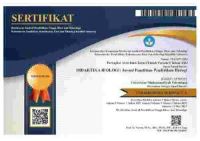KETERAMPILAN METAKOGNITIF MAHASISWA CALON GURU DAN HUBUNGANNYA DENGAN POLA PEMBELAJARAN DOSEN
Abstract
Penelitian ini bertujuan untuk mengidentifikasi keterampilan metakognitif mahasiswa calon guru pada mata kuliah Ekologi Tumbuhan dan menganalisis hubungannya dengan pola pembelajaran dosen. Metode penelitian yang digunakan adalah gabungan antara pendekatan kuantitatif dan kualitatif (metode campuran). Teknik sampling yang digunakan adalah simple random sampling. Instrumen yang digunakan untuk mengukur keterampilan metakognitif adalah tes essay keterampilan metakognitif yang terintegrasi dengan hasil belajar kognitif dan lembar wawancara dosen. Hasil penelitian menunjukkan skor rata-rata keterampilan metakognitif mahasiswa yang mengikuti matakuliah Ekologi Tumbuhan hanya 37,97. Kemudian, hasil penelitian juga mengungkap bahwa terdapat hubungan antara keterampilan metakognitif mahasiswa dan pola pembelajaran dosen. Pola pembelajaran yang diterapkan dosen pada matakuliah Ekologi Tumbuhan belum berbasis pada model pembelajaran tertentu dan belum memperhatikan perbedaan kemampuan akademik mahasiswa. Oleh karena itu, pola pembelajaran yang diterapkan tidak mendukung upaya permberdayaan keterampilan metakognitif.
This study aimed to identify the metacognitive skill of stuedents of teacher candidate in plant ecology subject at University of Muhammadiyah Palembang and to analyze its relationship with lecture’s learning system. The research method used was mixed quantitative-qualitative approach (mixed methods). The technique sampling used was simple random sampling. The instrument used for measurement of metacognitive skill was the essay test integrated by cognitive learning outcomes and lecturer’s interview sheet. The result showed that the average score of students’ metacognitive skill who attended the plant ecology subject was 37,97. Then, the result also showed that there was a relationship between student metacognitive skill and lecture’s learning system. The learning system applied by the lecturer in plant ecology subject was not based on the certain learning model yet, and was not paid attention to the differences in students' academic ability yet. Therefore, it did not support the empowerment of student metacognitive skills.
Keywords
Full Text:
PDFReferences
Adey, P. (2006). Thinking in Science-Thinking in General? Asia-Pacific Forum on Science Learning and Teaching, 7 (2), 1–6.
Anca, M. & Preda, V. (2012). Metacognitive Training Effects on Students Mathematical Performance from Inclusive Classrooms, 1–33. Diakses dari http://doctorat.ubbcluj.ro/sustinerea_publica/rezumate/2012/psihologie/moga_maier_anca_maria_en.pdf
Bahri, A. & Corebima, A.D. (2015). The Contribution of Learning Motivation and Metacognitive Skill on Cognitive Learning Outcome of Students within Different Learning Strategies. Journal of Baltic Science Education, 14 (4), 487–500.
Bahri, A., Corebima, A.D., Amin, M., & Zubaidah, S. (2015). Pengaruh Strategi Problem Based Learning (PBL) Terintegrasi Reading, Questioning, and Answering (RQA) pada Perkuliahan Biologi Dasar terhadap Motivasi Belajar, Keterampilan Metakognitif, Hasil Belajar Kognitif, Retensi, dan Karakter Mahasiswa Berkemampuan. Disertasi, tidak dipublikasikan. Universitas Negeri Malang.
Colbert, C.Y., Graham, L., West, C., White, B.A., Arroliga, A.C., Myers, J.D., Ogden, P.E., Archer, J., Mohammad, Z.T.A., & Clark, J. (2015). Teaching Metacognitive Skills: Helping Your Physician Trainees in the Quest to “Know What They Don’t Know”. The American Journal of Medicine, 128 (3), 318–324.
Corebima, A.D. (2009). Metacognitive Skill Measurement Integrated in Achievement Test. Diakses dari http://ftp.recsam.edu.my/cosmed/cosmed09/AbstractsFullPapers2009/Abstract/Science%20Parallel%20PDF/Full%20Paper/01.pdf
Corebima, A.D. (2016). Pembelajaran Biologi di Indonesia Bukan Untuk Hidup. Proceeding, Biology Education Conference, diselenggarakan oleh FKIP UNS, 6 Agustus 2016. Surakarta: Universitas Sebelas Maret.
Creswell, J.W. (2008). Educational Research: Planning, Conducting, and Evaluating Quantitative and Qualitative Research (3rd Ed.). Upper Saddle River, NJ: Prentice Hall.
Danial, M. (2010). Pengaruh Strategi PBL terhadap Keterampilan Metakognisi dan Respon Mahasiswa. Jurnal Chemica, 11 (2), 1–10.
Demirel, M., A?k?n, ?., & Ya?c?, E. (2015). An Investigation of Teacher Candidates’ Metacognitive Skills. Procedia – Social and Behavioral Sciences, 174, 1521–1528.
du Toit, S. & Kotze, G. (2009). Metacognitive Strategies in the Teaching and Learning of Mathematics. Pythagoras, 70, 57–67.
Iwai, Y. (2011). The Effects of Metacognitive Reading Strategies: Pedagogical Implications for EFL/ESL Teachers. The Reading Matrix, 11 (2), 150–159.
Jiang, Y., Ma, L., & Gao, L. (2016). Assessing Teachers’ Metacognition in Teaching: The Teacher Metacognition Inventory. Teaching and Teacher Education, 59, 403–413.
Kaberman, Z. & Dori, Y.J. (2009). Metacognition in Chemical Education: Question Posing in the Case-Based Computerized Learning Environment. Instructional Science, 37 (5), 403–436.
Memnun, D. S. & Akkaya, R. (2009). The Levels of Metacognitive Awareness of Primary Teacher Trainees. In Procedia - Social and Behavioral Sciences, 1, 1919–1923.
Muhlisin, A., Susilo, H., Amin, M., & Rochman, F. (2016). Pengembangan Model Pembelajaran Reading Mind Mapping Sharing (RMS) dan Pengaruhnya terhadap Penguasaan Konsep, Keterampilan Berpikir Kritis, Keterampilan Metakognitif, serta Retensi Mahasiswa Berkemampuan Akademik Berbeda. Disertasi, tidak dipublikasikan. Universitas Negeri Malang.
Muhlisin, A., Susilo, H., Amin, M., & Rochman, F. (2016). Analisis Keterampilan Metakognitif Ditinjau dari Kemampuan Akademik Berbeda pada Perkuliahan Konsep Dasar IPA. Prosiding, Seminar Nasional Biologi yang Diselenggarakan Oleh FMIPA Unesa, 20 Februari 2016. Surabaya: Universitas Negeri Surabaya.
Nafilah, E. & Azizah, U. (2015). Keterampilan Metakognitif Siswa melalui Model Pembelajaraan Kooperatif Tipe Numbered Heads Together (NHT) pada Materi Kesetimbangan Kimia di Kelas XI SMA Negeri 1 Sumenep. Journal of Chemical Education, 4 (2), 204–211.
Scott, C.L. (2015). The Futures of Learning 3: What kind of pedagogies for the 21st century? Diakses dari unesdoc.unesco.org/images/0024/002429/242996E.pdf
Siswati, B.H., Corebima, A.D., Susilo, H., & Mahanal, S. (2017). Mengungkap Kesejajaran dan Faktor yang Berpengaruh terhadap Koefisien Slope dan Intercept dari Persamaan Regresi Hubungan antara Keterampilan Metakognitif dan Pemahaman Konsep Siswa pada Pembelajaran IPA dan Biologi di Malang. Disertasi, tidak dipublikasikan. Universitas Negeri Malang.
Sumampouw, H., Rengkuan, M., Siswati, B. H., & Corebima, A. D. (2016). Metacognition Skill Development in Genetic Lecture at State University of Malang Indonesia. International Journal of Educational Policy Research and Review, 3 (3), 36–42.
Syarifah, H., Indriwati, S.E., & Corebima, A.D. (2016) Pengaruh Strategi Pembelajaran Reading Questioning and Answering (RQA) dipadu Think Pair Share (TPS) terhadap Keterampilan Metakognitif Siswa Laki-Laki dan Perempuan SMAN di Kota Malang. Jurnal Pendidikan: Teori, Penelitian, dan Pengembangan, 1 (5), 801–805.
Veenman, M. V. J., Bavelaar, L., De Wolf, L., & Van Haaren, M. G. P. (2014). The On-Line Assessment of Metacognitive Skills in A Computerized Learning Environment. Learning and Individual Differences, 29, 123–130.
Veenman, M. V. J., Blote, R. K., & W, A. (2005). The Relation Between Intellectual and Metacognitive Skills in Early Adolescence. Instructional Science, 33 (3), 193–211.
Veenman, M.V.J., Van Hout-Wolters, B.H.A.M., & Afflerbach, P. (2006). Metacognition and Learning: Conceptual and Methodological Considerations. Metacognition and Learning, 1 (1), 3–14.
Veenman, M.V.J., Wilhelm, P., & Beishuizen, J.J. (2004). The Relation between Intellectual and Metacognitive Skills from A Developmental Perspective. Learning and Instruction, 14 (1), 89–109.
Wulanningsih, S., Prayitno, B.A., & Proboarso, R.M. (2012) Pengaruh Model Pembelajaran Inkuiri Terbimbing terhadap Keterampilan Proses Sains ditinjau dari Kemampuan Akademik Siswa SMA Negeri 5 Surakarta. Jurnal Pendidikan Biologi, 4 (2), 33–43.
Zhao, N., Wardeska, J.G., McGuire, S.Y., & Cook, E. (2014). Metacognition: An Effective Tool to Promote Success in College Science Learning. Journal of College Science Teaching, 43 (4), 48–54.
DOI: https://doi.org/10.32502/dikbio.v1i2.688
Copyright (c) 2017 Didaktika Biologi: Jurnal Penelitian Pendidikan Biologi
Didaktika Biologi: Jurnal Penelitian Pendidikan Biologi is indexed by:

Didaktika Biologi: Jurnal Penelitian Pendidikan Biologi is licensed under a Creative Commons Attribution-ShareAlike 4.0 International License.







